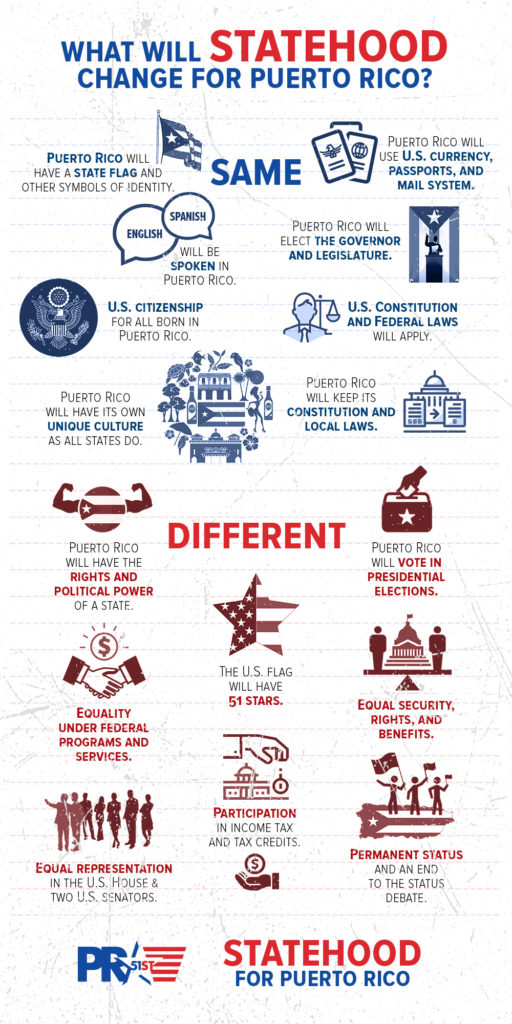Puerto Rico has voted for statehood three times, but the House Committee on Natural Resources (the Congressional committee in charge of Puerto Rico) is not ready to take action on those votes.
We hear the phrase “all options” being used, as though there were lots of possibilities that haven’t been included in the three-way votes or in the yes/no vote on statehood. The implication is that Puerto Ricans have not been offered some other possibility that might be better than the ones we already know about.
Puerto Rico has already chosen statehood
Following the 2012 vote, in which 61% of votes cast on the question of the best status going forward favored statehood, the Committee on Energy and Natural Resources of the Senate held a hearing to clarify the 2012 plebiscite.
The Chairman of the Committee said in that hearing that “there is no disputing that a majority of the voters in Puerto Rico—54 percent—have clearly expressed their opposition to continuing the current territorial status”. The ranking minority member of the Committee said, “It is clear to me that the majority of Puerto Ricans do not favor the current territorial status”.
Yet, in the 2017 referendum, the U.S. Department of Justice insisted that the current territorial status be included in the vote. In 2017, 97% of voters chose statehood.
In 2020, on a vote offering statehood or — the alternative — a decision against statehood, 53% chose statehood. That’s a clear majority.
It seems obvious that Puerto Rico has already chosen statehood.
However, Congress is not required to respect that. Grijalva has the legal right to recommend another plebiscite for Puerto Rico and to include “all the options.”
So what are the options?
Puerto Rico has three possible status options under the U.S. Constitution.
Independent nation
Independence has never gotten more than 5% of the votes in any status referendum in Puerto Rico. No Independence Party candidate has ever won a gubernatorial election. Independence is quite simply not what Puerto Rico wants. This is an obvious argument against independence for Puerto Rico.
Another drawback to independence for Puerto Rico is the economic weakness of the Island. Puerto Rico imports up to 85% of the food eaten by residents and the government is unable to pay for medical care or education. Independence supporters assume that the United States will continue to provide financial support for a newly independent Puerto Rico, but that is not a sure thing.
Puerto Rico could become an independent nation with a Free Association agreement with the United States. This would be an agreement which either side could change at any time — that’s the “free” part of the association. There are nations in these relationships with the United States right now. Their experiences show that the United States feels free to alter its agreements.
Advantages of independence would include the ability to make trade agreements with other nations and the ability to compete in the Olympic and the Miss Universe competition.
U.S. territory
Continuing as a territory means continuing in the status quo. As an unincorporated territory, Puerto Rico is subject to federal laws and is under the control of Congress. Puerto Rico can’t vote in presidential elections and has no senators or voting members of the House of Representatives. The Island receives less federal support than it would if it were a state, and has much higher rates of poverty than any state.
What are the advantages? Compared with independent nations in the Caribbean, Puerto Rico as a territory has a stable government and can be confident of U.S.military support. This is an advantage compared with independence, and would not change under statehood.
The people of Puerto Rico are U.S. citizens and can travel and work freely in any state. Again, this would continue to be true if Puerto Rico were a state, but probably not under independence.

State
Puerto Rico can also become a state. As a state, Puerto Rico would have the same rights and responsibilities as all the other states. The residents of Puerto Rico would be able to vote in presidential elections and would have equal representation in Congress. Federal support would increase to the levels guaranteed to states.
Every territory which has become a state has benefited economically. There is no reason to think that Puerto Rico would not be better off economically as a state.
Disadvantages of statehood? The top contender is the idea that Puerto Rico would lose its culture. As Governor Pedro Pierluisi said, this claim is an insult to the Puerto Rican people. At this point, many more Puerto Ricans live in states than in Puerto Rico. If the culture were going to disappear, we would have seen it happen.
The other claim is that Puerto Rico would lose the chance to negotiate for some entirely new relationship not included in the legally viable options described here. While being an unincorporated territory of the United States is obviously not the best option, becoming a state would put a definitive end to the fantasy of “enhanced commonwealth.” All three branches of the federal government have stated clearly that they will not negotiate anything like the fantasy “commonwealth” leaders have proposed. They have said that it is “not viable” and that it is unconstitutional. The loss of this imaginary opportunity is not a real disadvantage to statehood.
The Department of Justice concurs
The Department of Justice said “the only constitutionally permissible status options available…are statehood, independence, or Puerto Rico’s current status as a territory.” While Nydia Velazquez has said that Congress, of which she is a member, gets to make laws and doesn’t have to listen to the Department of Justice, Congress is required to observe the U.S. Constitution.







No responses yet